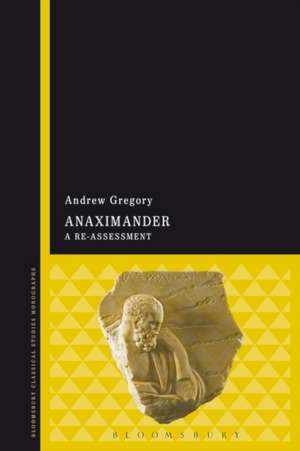Anaximander: A Re-assessment
Autor Andrew Gregoryen Limba Engleză Paperback – 23 aug 2017
| Toate formatele și edițiile | Preț | Express |
|---|---|---|
| Paperback (1) | 258.89 lei 6-8 săpt. | |
| Bloomsbury Publishing – 23 aug 2017 | 258.89 lei 6-8 săpt. | |
| Hardback (1) | 775.43 lei 6-8 săpt. | |
| Bloomsbury Publishing – 24 feb 2016 | 775.43 lei 6-8 săpt. |
Preț: 258.89 lei
Preț vechi: 296.10 lei
-13% Nou
Puncte Express: 388
Preț estimativ în valută:
49.54€ • 51.72$ • 40.100£
49.54€ • 51.72$ • 40.100£
Carte tipărită la comandă
Livrare economică 04-18 aprilie
Preluare comenzi: 021 569.72.76
Specificații
ISBN-13: 9781350044272
ISBN-10: 135004427X
Pagini: 312
Dimensiuni: 234 x 158 x 20 mm
Greutate: 0.43 kg
Ediția:NIPPOD
Editura: Bloomsbury Publishing
Colecția Bloomsbury Academic
Locul publicării:London, United Kingdom
ISBN-10: 135004427X
Pagini: 312
Dimensiuni: 234 x 158 x 20 mm
Greutate: 0.43 kg
Ediția:NIPPOD
Editura: Bloomsbury Publishing
Colecția Bloomsbury Academic
Locul publicării:London, United Kingdom
Caracteristici
Pulling together different strands of Anaximander's thought, this study presents a rounded and coherent perspective on his work
Notă biografică
Andrew Gregory is Professor of History and Philosophy of Science, University College London, UK. He is the author of many books on the science of the ancient world, including Plato's Philosophy of Science (2000), Eureka! The Birth of Science (2001) and Ancient Greek Cosmogony (2008).
Cuprins
PrologueIntroduction1. Anaximander and Historiography2. Anaximander's Zoogony3. Anaximander and Meteorology4. The Extant Fragment5. The Apeiron6. Cosmogony and Steering7. Anaximander: One Cosmos or Many?8. The Stability of the Cosmos9. Anaximander's Cosmology and Astronomy10. Anaximander's NumbersConclusionBibliographyIndex
Recenzii
Andrew Gregory's Anaximander: A Re-assessment is well-argued book that gives us a systematic Anaximander with a network of connecting views on the well-ordered nature of things, including zoogony, meteorology, cosmology, and astronomy. Gregory's careful analysis of ancient texts and modern interpretations is a boon for students and for anyone interested in the beginnings of Greek philosophy and science.
Gregory's Anaximander describes how the first great Greek cosmologist looks back to his poetic predecessors and how later thinkers, particularly Plato, look back to him. By emphasizing the stability, symmetry, and order of Anaximander's system and its integration of natural philosophical and theological principles, Gregory provides a stimulating and welcome contribution to the study of early Greek philosophy.
This book offers a persuasive attempt to show Anaximander as a systematic thinker whose coherent and far-reaching views on cosmology, astronomy, meteorology, and zoogony are based on observation and folk-knowledge. It gives thoughtful attention to those fragments of Anaximander which are frequently overlooked, while also showing the fruitfulness of making explicit the Homeric and Hesiodic background against which Anaximander writes. More generally, this book provides a careful discussion of the particular way in which a Presocratic thinker can be scientifically-minded and yet allow divinity an important place in his account of the world.
Gregory's Anaximander describes how the first great Greek cosmologist looks back to his poetic predecessors and how later thinkers, particularly Plato, look back to him. By emphasizing the stability, symmetry, and order of Anaximander's system and its integration of natural philosophical and theological principles, Gregory provides a stimulating and welcome contribution to the study of early Greek philosophy.
This book offers a persuasive attempt to show Anaximander as a systematic thinker whose coherent and far-reaching views on cosmology, astronomy, meteorology, and zoogony are based on observation and folk-knowledge. It gives thoughtful attention to those fragments of Anaximander which are frequently overlooked, while also showing the fruitfulness of making explicit the Homeric and Hesiodic background against which Anaximander writes. More generally, this book provides a careful discussion of the particular way in which a Presocratic thinker can be scientifically-minded and yet allow divinity an important place in his account of the world.
